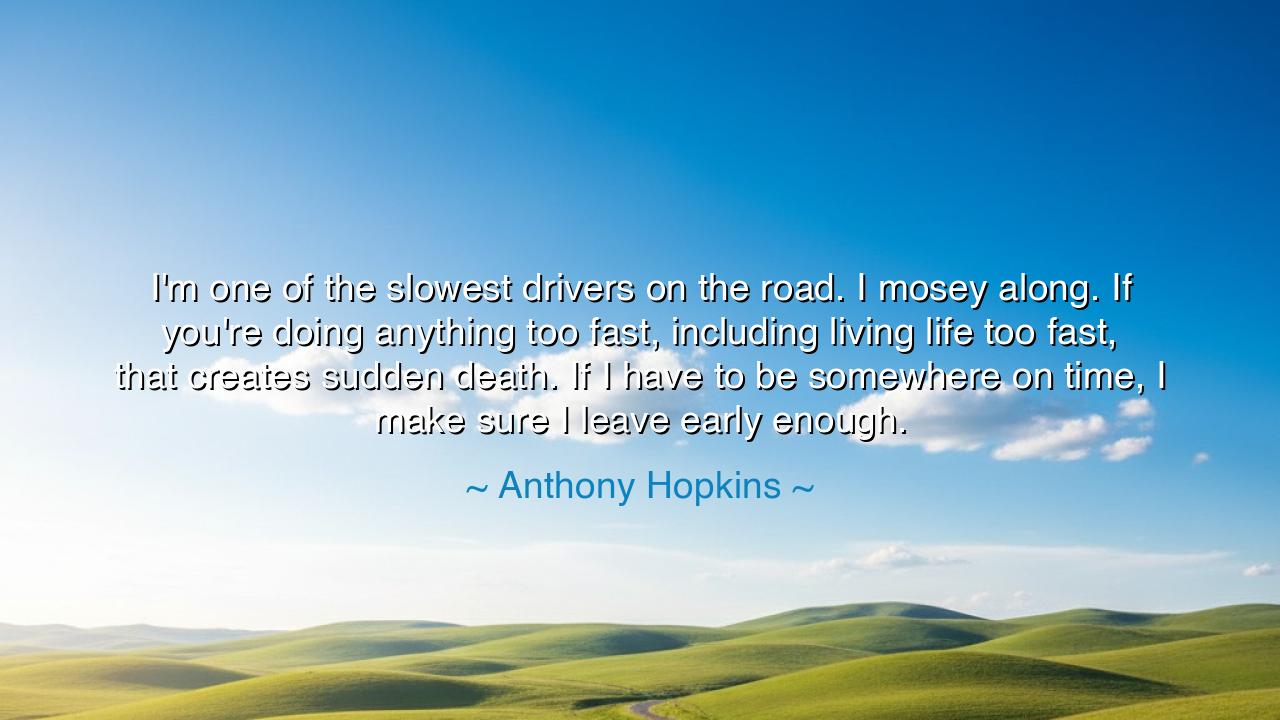
I'm one of the slowest drivers on the road. I mosey along. If
I'm one of the slowest drivers on the road. I mosey along. If you're doing anything too fast, including living life too fast, that creates sudden death. If I have to be somewhere on time, I make sure I leave early enough.






The masterful actor Anthony Hopkins, whose craft and spirit have traversed the landscapes of art and time, once said: “I’m one of the slowest drivers on the road. I mosey along. If you’re doing anything too fast, including living life too fast, that creates sudden death. If I have to be somewhere on time, I make sure I leave early enough.” In these humble words lies not a mere confession about driving, but a philosophy of life, ancient in wisdom and enduring in truth. Hopkins speaks to a world intoxicated by haste — a world that runs without direction, that burns through its days as if immortality were guaranteed. He reminds us that slowness, patience, and deliberate living are not weakness, but mastery.
Since the dawn of civilization, the wise have warned of the danger of speed — not only of the body, but of the spirit. The ancient Greeks spoke of hubris, the reckless pride that drives men to outpace the gods. The Taoists of China taught that harmony lies in flow, not in frenzy. The slow river, they said, reaches the sea just as surely as the storm — but with peace instead of ruin. Hopkins, in his quiet humor, echoes these sages. To “mosey along” is to walk in rhythm with life itself, to understand that the destination will arrive when it must, and that rushing through existence is its own form of dying.
“If you’re doing anything too fast, including living life too fast, that creates sudden death.” In this single line, Hopkins touches the very core of modern tragedy. How many lives are lost not by accident, but by overexertion, by the invisible violence of endless urgency? The one who runs without rest, who measures their worth by speed, eventually collapses beneath the weight of their own motion. It is not only the body that breaks — it is the soul that withers. Speed consumes presence, and presence is the essence of life. The one who cannot slow down never truly sees the beauty before them, nor hears the quiet song of being.
Consider the tale of Emperor Ashoka, the great ruler of India. In his youth, he conquered lands with fierce ambition, moving swiftly through blood and fire to expand his empire. Yet after the carnage of Kalinga, when he beheld the dead strewn upon the earth, his heart broke. He realized that his speed toward glory had led him to emptiness. He turned away from war and embraced the path of patience, dedicating his life to peace, reflection, and compassion. What Hopkins teaches with the language of everyday living, Ashoka embodied with the transformation of a king: that to slow down is not to lose, but to awaken.
The origin of Hopkins’ words lies in the wisdom of a man who has lived long enough to see how fleeting everything is. Fame, fortune, applause — all these he has known, and yet he chooses simplicity. By speaking of driving, he speaks of control, of self-awareness, of balance. A car that speeds recklessly crashes; a life that rushes without pause breaks the same way. When he says he “leaves early enough,” it is not only about punctuality, but about foresight — about living with intention rather than reaction. It is a call to prepare one’s path with care, so that peace accompanies every step.
There is humility in his wisdom, but also strength. The modern world praises the fast, the productive, the tireless — yet these are often the first to fall. Hopkins, like a sage wrapped in the garments of an artist, reminds us that the slow flame burns longest. To move with awareness is to honor life’s fragility; to rush is to mock it. He has seen too many lives — both in story and in truth — consumed by the illusion that more speed means more life. But in truth, it means less.
So what lesson, then, shall we carry from his words? Slow down. Walk instead of running. Speak with thought instead of haste. When you drive, when you work, when you love — let there be space between the moments. Make room for breath. Plan with care, so that you may live without panic. Leave early for your destinations, both literal and spiritual. This is not laziness — it is wisdom, the art of timing your life with grace.
For in the end, as Anthony Hopkins teaches, life is not a race to be won, but a song to be sung in tempo with the heart. The one who hurries misses the music; the one who slows down hears every note. To live slowly is not to live less — it is to live deeply, deliberately, beautifully. And when your journey ends, you will have truly lived — not in haste, but in harmony with the great rhythm of existence, where time itself bows to the one who has learned the power of moving slowly.






AAdministratorAdministrator
Welcome, honored guests. Please leave a comment, we will respond soon